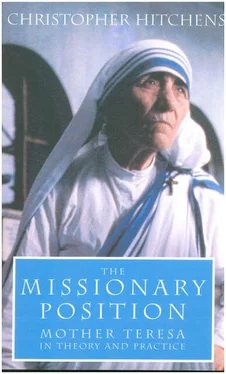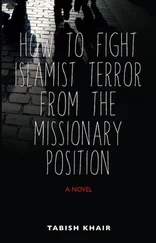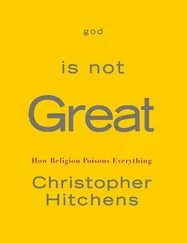
The suspicion that there might be something faux naïf about the appeal occurred also to Mr Paul Turley who, in his capacity as Deputy District Attorney for Los Angeles, was Mr Keating’s co-prosecutor. On his own initiative, and as a private citizen, he wrote and despatched a careful reply. I reproduce it below for the first time:
Dear Mother Teresa:
I am a Deputy District Attorney in Los Angeles County and one of the persons who worked on the prosecution of your benefactor, Charles H. Keating, Jr. I read your letter to Judge Ito, written on behalf of Mr. Keating, which includes your admission that you know nothing about Mr. Keating’s business or the criminal charges presented to Judge Ito. I am writing to you to provide a brief explanation of the crimes of which Mr. Keating has been convicted, to give you an understanding of the source of the money that Mr. Keating gave to you, and to suggest that you perform the moral and ethical act of returning the money to its rightful owners.
Mr. Keating was convicted of defrauding 17 individuals of more than $900,000. These 17 persons were representative of 17,000 individuals from whom Mr. Keating stole $252,000,000. Mr. Keating’s specific acts of fraud were that he was the source of a series of fraudulent representations made to persons who bought bonds from his company and he also was the repository of crucial information which he chose to withhold from bond purchasers, thereby luring his victims into believing they were making a safe, low-risk investment. In truth and in fact, their money was being used to fund Mr. Keating’s exorbitant and extravagant lifestyle.
The victims of Mr. Keating’s fraud come from a wide spectrum of society. Some were wealthy and well-educated. Most were people of modest means and unfamiliar with high finance. One was, indeed, a poor carpenter who did not speak English and had his life savings stolen by Mr. Keating’s fraud.
The biblical slogan of your organization is ‘As long as you did it to one of these My least brethren. You did it to Me’. The ‘least’ of the brethren are among those whom Mr. Keating fleeced without flinching. As you well know, divine forgiveness is available to all, but forgiveness must be preceded by admission of sin. Not only has Mr. Keating failed to admit his sins and his crimes, he persists in self-righteously blaming others for his own misdeeds. Your experience is, admirably, with the poor. My experience has been with the ‘con’ man and the perpetrator of the fraud. It is not uncommon for ‘con’ men to be generous with family, friends and charities. Perhaps they believe that their generosity will purchase love, respect or forgiveness. However, the time when the purchase of ‘indulgences’ was an acceptable method of seeking forgiveness died with the Reformation. No church, no charity, no organization should allow itself to be used as salve for the conscience of the criminal. We all are grateful that forgiveness is available but we all, also, must perform our duty. That includes the Judge and the Jury. I remind myself of the biblical admonition of the Prophet Micah: ‘O man, what is good and what does the Lord require of you. To do justice, love mercy and walk humbly.’
We are urged to love mercy but we must do justice.
You urge Judge Ito to look into his heart — as he sentences Charles Keating — and do what Jesus would do. I submit the same challenge to you. Ask yourself what Jesus would do if he were given the fruits of a crime; what Jesus would do if he were in possession of money that had been stolen; what Jesus would do if he were being exploited by a thief to ease his conscience?
I submit that Jesus would promptly and unhesitatingly return the stolen property to its rightful owners. You should do the same. You have been given money by Mr. Keating that he has been convicted of stealing by fraud. Do not permit him the ‘indulgence’ he desires. Do not keep the money. Return it to those who worked for it and earned it!
If you contact me I will put you in direct contact with the rightful owners of the property now in your possession.
Sincerely, Paul W. Turley
Three years later, Mr Turley has received no reply to his letter. Nor can anybody account for the missing money: saints, it seems, are immune to audit.
This is by no means the only example of Mother Teresa’s surreptitious attitude to money, nor of her hypocritical protestations about the beauty of poverty, whether self-imposed or otherwise. But it is the clearest and best-documented instance, and it is proof against the customary apologetics about innocence and unworldliness. In her dealings with pelf, as in her transactions with power, Mother Teresa reigns in a kingdom that is very much of this world.
Naturally, there are puzzles. I would like to know whether or not the universe is finite or infinite. I would like even better to be assured that the two words are meaningless. But excepting the sort of puzzle which makes our passage here interesting and gives incentive to our questioning games, I see no mystery at the heart of things and take comfort from Wittgenstein’s profoundly unpopular dictum, ‘Philosophy simply puts everything before us, and neither explains nor deduces anything. Since everything lies open to view there is nothing to explain. For what is hidden, for example, is of no interest to us.’
Gore Vidal,
Two Sisters
The Bible commands us to love our enemies. I love the Pope very much.
Father Jean-Bertrand Aristide, president of Haiti
At a certain point in the period of its mediaeval ascendancy, the Church of Rome was forced to confront a problem of theory and of practice. If a human soul could only be redeemed by acceptance of the New Testament canon — the birth, life, death and resurrection of Jesus Christ — then what was to become of those who had never heard the news? These were not heretics or infidels to be slain or burned but people who suffered from ‘invincible ignorance’. They fell into two categories: those who lived in parts of the world unvisited and untouched by the faith, and those who had died before the Christian era began. (There was also a third category, namely the disciples of Jesus himself, who had never read the Bible story, either. But they were, and remain, exempt.) Not much could be done for those who had expired before the birth of Christ, though Dante did his best for them and there are passages in the Creeds which speak of Jesus descending into hell in order to carry out some retrospective redemption. But for those who lived in non-Christian lands, it was decreed that the work of conversion was an imperative.
It is, in a sense, a pity that this work will always be remembered for its association either with conquest, with religious fratricide or with imperialism. Very frequently, the main consequence was sanguinary conflict between different branches of Christianity itself. (Long after the Catholic Crusaders got to Jerusalem, for example, they sacked Orthodox and Byzantine Constantinople.) In later epochs, both Catholic and Protestant missionaries penetrated the interiors of China and Japan and the remotest parts of Africa and South America, but their presence was indissoluble from that of the trading post and the garrison. In the course of a profitable partnership with slavery, colonialism and forced labour, the Christian ‘civilizing mission’ often came up against strongly entrenched local religions. Where it did not adapt to these, or eliminate their believers, it made little headway. In India, which was disputed as a prize between four principal European powers before passing under British suzerainty, the effect of Christianity has been relatively slight. The Indian authorities, who are suspicious to this day of the link between proselytization and foreign interference, have generally discouraged missionary activity. They have left Mother Teresa’s Missionaries of Charity largely alone, however, in deference to the worldwide reputation of their founder. The Mother Teresa establishment in Calcutta, therefore, possesses elements of pathos and nostalgia: it is the chief and lonely relic of what was once a vast enterprise of conquest and crusading.
Читать дальше












